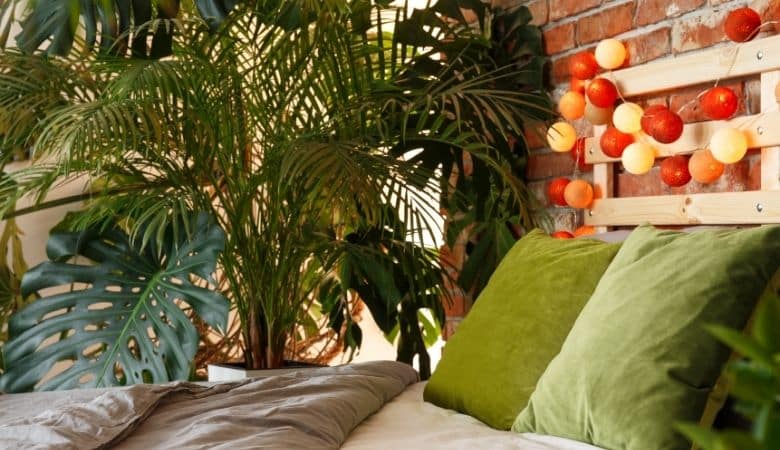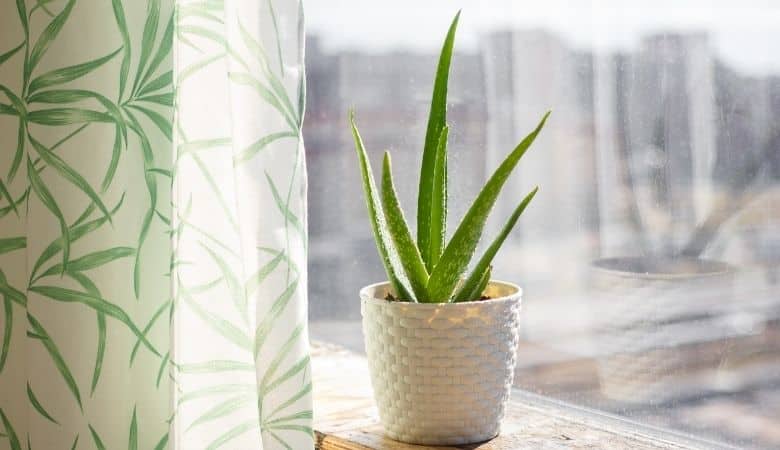Houseplants are great for our heath – they release oxygen and absorb carbon dioxide (CO2). That not only freshens up the air but also eliminates harmful toxins.
Plants also improve our overall concentration and productivity by up to 15%, reduce stress, and boost our mood. With all of these attributes, plants are great for our home and workspace.
But what about the bedroom? Is it good or bad to have plants in the bedroom? Plants help improve air quality and provides a nice touch of greenery which is de-stressing to many people and hence would be good to have in a bedroom. With that said, avoid having large and/or many plants, especially in a small and/or poor ventilated bedroom, as this can lead to high levels of CO2 during the night once the photosynthesis of the plant(s) stop. High levels of CO2 is toxic to humans and most mammals.
Read on to learn more about the potential danger of CO2 as well as the benefits and drawbacks of having plants in the bedroom.
Huh, Do Plants Absorb or Release CO2?
So how is it that plants are releasing oxygen and absorbing CO2 and then suddenly releasing CO2 that can be harmful?
Well, plants process through photosynthesis, which produces oxygen, and then process respiration, which produces CO2. Photosynthesis can only process under the sunlight, which means that photosynthesis stops at night.
Therefore, plants stop producing oxygen, and instead, they consume oxygen to process respiration. And due to this, many people believe that plants will consume the oxygen in the bedroom and release CO2.
The Effects of Carbon Dioxide

If you enjoy being outdoors and the benefits that nature affords us, then you probably enjoy the beauty and greenery of plants. There’s something about that greenery that perks you up. And when you have the opportunity to bring that indoors! Let’s face it – plants can perk up any room. And taking care of plants can be very therapeutic. Seems as though plants can only bring good vibes.
However, there are concerns that the carbon dioxide produced during the night by plants could be harmful. Knowing that plants have the secret formula to replace your oxygen with carbon dioxide all of a sudden doesn’t seem as appealing.
CO2 can be toxic and harmful to humans. Exposure to CO2 can produce a variety of health effects, which can include headaches, dizziness, restlessness, tingling or pins or needles feeling, difficulty breathing, sweating, tiredness, increased heart rate, elevated blood pressure, coma, asphyxia, and convulsions.
As the night goes on and the air in the room has increasingly more carbon dioxide, your blood may have an abnormally high concentration of CO2. Your body responds by increasing your breathing rate to access more oxygen. That takes the form of short, quick breaths, small gasps, and head-tossing. The change in your breathing pattern and the accompanying activity can disrupt your sleep.
Concentrations of more than 10% of carbon dioxide may cause convulsions, coma, and even death. CO2 levels of more than 30% act rapidly, leading to loss of consciousness in seconds.
So, Can CO2 Released From Plants be Harmful?
So the question then becomes whether plants that release CO2 at night would significantly compromise the air in a bedroom while you’re sleeping.
There seems to be a mixture of responses to this question. On the one hand, plants can clean the air of chemical toxins, and add oxygen to the air during the day. On the other hand, most plants produce CO2 at night and can be harmful — even fatal. The amount of CO2 released could rightfully depend on the number of plants in the bedroom. It could also depend on the size of your bedroom.
If you have a large bedroom, one small or medium-sized plant won’t affect your sleep patterns or air quality. Small plants such as spider plants and peace lilies are acceptable.
What defining dimensions qualify a bedroom as large? The jury is still out on that.
Benefits and Drawbacks of Having Plants in the Bedroom

We’ve already talked about some of the benefits of having plants in the bedroom. But it’s only fair to you to provide a comprehensive list of the benefits and drawbacks as you’re considering what could be a life-changing decision for you.
Benefits of Having Plants in the Bedroom
- During the day plants produce additional oxygen and reduces the quantities of carbon dioxide, carbon monoxide, and natural toxins like benzene and formaldehyde, which help you to breathe and sleep better.
- A live plant acts as a natural air purifier because it cleans and purifies the air. It will create a fresh and clean environment for you to better rest.
- Plants add a touch of natural greenery. If you’re a nature lover, that’s important to you. It can be relaxing and that reduces stress. Also, they’re an inexpensive way to jazz up the look of your room.
- Some plants help to reduce our exposure to electromagnetic radiation, even in the bedroom.
Drawbacks of Having Plants in the Bedroom
- Because plants cause us to feel more energized, that may not be the appropriate energy for what the bedroom intends. The bedroom is intended for rest and rejuvenation. Therefore, having plants in the room may cause difficulty in sleeping.
- Live plants are messy and placement is everything. They need soil and water regularly to thrive. That can lead to the occasional mess if the pot is tumbled over or water spills. Placing a live plant in an awkward place like your bedside table or close to electrical items could lead to other problems.
- If you have pets in the home, be especially careful of what plant you choose. Some houseplants could be extremely dangerous for your pets if ingested. Always check to see if a plant is poisonous to your pet before bringing it home and placing it anywhere.
- As we’ve been discussing, plants produce carbon dioxide at night rather than oxygen. Over some time, they could cause harm to the sleeper by taking away the oxygen. That is especially true for someone in a small bedroom with a large plant or many smaller plants. However, there’s minimum risk if the room is well ventilated.
Best Plants For The Bedroom

To add even more confusion to all of this, certain plants have been identified as good to have in the bedroom because they actually produce oxygen at night as well.
That list of plants include:
- Aloe Vera
- Areca Palm
- Jasmine
- Lavender
- Peace Lily
- Snake Plant
- English Ivy
- Philodendron
- Rosemary
- Spider Plant
Conclusion
While there is still not a direct answer to whether or not plants are good or bad for the bedroom, there is enough information for each individual to decide for themselves.
Although we know that plants can emit CO2 at night once the photosynthesis stops, there is not enough evidence to determine if the CO2 produced is enough to be harmful. Also, we’ve identified that not all plants emit CO2 at night. In the end, hopefully, this is helpful as you also consider the pros and cons of having a plant in the bedroom.
